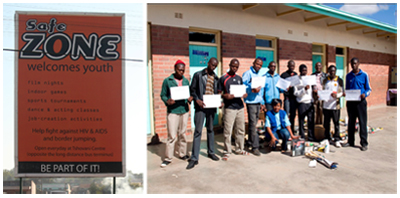18-year-old Tapiwa joined the Safe Zone in 2007 on its inception as a diversion to the boredom that characterized his days in Tshovani Chiredzi, a shanty suburb in South Eastern Zimbabwe.
Having lost both parents at a tender age, Tapiwa decided to fend for his siblings through irregular migration doing menial jobs in South Africa.
"The journeys to South Africa were arduous since I walked most of the way as I did not have money for transport. But what choice did I have? My siblings needed food on the table and my relatives had turned their backs on us," said a gloomy faced Tapiwa.
Through a billboard Tapiwa got to know of the Safe Zone. He became curious about a place that promised fun for him and his siblings who would for once forget their abject poverty through participation in edutainment activities.
The establishment of the Safe Zones in Zimbabwe is one of the major thrust of the Safe Journey Information Campaign Program of IOM. The town of Chiredzi was selected to be one of the areas for the implementation of the Safe Zone because of the high number of youths jumping the border to South Africa or Mozambique.
The Safe Zone activities appealed to his young heart and he was selected as a peer educator. Though enjoying peer education, Tapiwa often felt guilty about encouraging his peers to adopt safe migration when he himself survived through this risky and illegal route at some point in his life. His worry was soon set to rest with a monthly stipend that came from being a peer educator.

"I know what it was like being in a foreign country without the required documents. I had been harassed as a foreigner. Sometimes I got less than what I had worked for and later deported but poverty back home kept me going back for menial jobs. I was relieved when IOM told me I could get an allowance as a peer educator; at least I could avoid the stress and hard times in South Africa."
Tapiwa says that his breakthrough finally came in 2010 when their recommendations for an income generating project were positively responded to. He enrolled in a welding course.
"There were several options such as carpentry and motor mechanics but I thought welding was my gateway to quick cash which I needed badly to feed my family." It was however not an easy road as Tapiwa later realized. "Some of the courses were theoretical and I could not manage as I had dropped out of school at primary level. I thought my dreams were being shattered." Luckily for him the vocational training centre tailor made the course to suit his needs.
After eight months of intensive training, Tapiwa graduated with a practical certificate in welding. Tapiwa received a start up tool kit to enhance his newly acquired entrepreneurial skill.
"I was so elated. It was like so many doors had been opened for me. I could get cash almost on daily basis and could support my siblings. I could save up for a passport and finally work in South Africa where welding is big business."
Tapiwa is among many youths who have benefited from the IOM Safe Zone, a youth centre initiative that seeks to empower young people between the ages of 15 and 24, from disadvantaged communities with life skills in an effort to reduce irregular migration. The centres also offer information on safe life programmes such as HIV and AIDS awareness.
The livelihoods initiative offers young people alternatives back home and gives them reason to stay in their home country. This project was made possible with generous support from UKAID.
For more information, please contact Folen Murapa, IOM Harare, fmurapa@iom.int